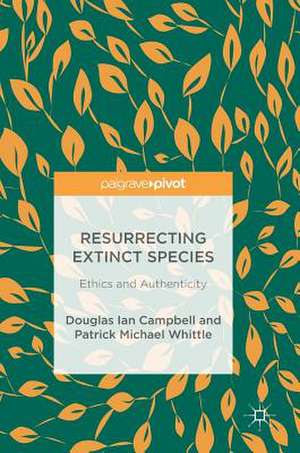Resurrecting Extinct Species: Ethics and Authenticity
Autor Douglas Ian Campbell, Patrick Michael Whittleen Limba Engleză Hardback – 7 dec 2017
| Toate formatele și edițiile | Preț | Express |
|---|---|---|
| Paperback (1) | 444.52 lei 43-57 zile | |
| Springer International Publishing – 22 iun 2018 | 444.52 lei 43-57 zile | |
| Hardback (1) | 450.49 lei 43-57 zile | |
| Springer International Publishing – 7 dec 2017 | 450.49 lei 43-57 zile |
Preț: 450.49 lei
Nou
Puncte Express: 676
Preț estimativ în valută:
86.20€ • 90.23$ • 71.75£
86.20€ • 90.23$ • 71.75£
Carte tipărită la comandă
Livrare economică 31 martie-14 aprilie
Preluare comenzi: 021 569.72.76
Specificații
ISBN-13: 9783319695778
ISBN-10: 3319695770
Pagini: 128
Ilustrații: IX, 128 p. 1 illus.
Dimensiuni: 148 x 210 mm
Greutate: 0.32 kg
Ediția:1st ed. 2017
Editura: Springer International Publishing
Colecția Palgrave Macmillan
Locul publicării:Cham, Switzerland
ISBN-10: 3319695770
Pagini: 128
Ilustrații: IX, 128 p. 1 illus.
Dimensiuni: 148 x 210 mm
Greutate: 0.32 kg
Ediția:1st ed. 2017
Editura: Springer International Publishing
Colecția Palgrave Macmillan
Locul publicării:Cham, Switzerland
Cuprins
Chapter 1. Wildlife Conservation in a Brave New World.- Chapter 2. Backbreeding: From Cow to Auroch.- Chapter 3: From Elephant to Mammoth by Coning and Genetic Engineering.- Chapter 4. Bringing back birds: passenger pigeons and huia.- Chapter 5. Resurrecting Neanderthals: De-extinction at the ethical limit.- Chapter 6. Mammoth or pseudo-mammoth? The authenticity question.- Chapter 7. Arguments For and Against De-extinction.- Chapter 8. Why, Which, When, and How: the ethics of de-extinction.
Notă biografică
Douglas Campbell is Philosophy Lecturer at the University of Canterbury, New Zealand, and completed his PhD at the University of Arizona, USA. With a background in biology, he has worked as a wildlife warden and conservationist. His research interests include philosophy of mind, philosophical logic, epistemology and metaphysics. His work on de-extinction has included public lectures, conference presentations, and academic journal articles.
Patrick Michael Whittle, who holds a PhD in Philosophy from the University of Canterbury, New Zealand, is a freelance writer and journalist based in Christchurch, New Zealand. As well as writing about science, politics and environmental issues (including de-extinction) at both a popular and academic level, he has worked in universities and educational establishments in New Zealand, Europe, the Middle East and Central Asia.
Patrick Michael Whittle, who holds a PhD in Philosophy from the University of Canterbury, New Zealand, is a freelance writer and journalist based in Christchurch, New Zealand. As well as writing about science, politics and environmental issues (including de-extinction) at both a popular and academic level, he has worked in universities and educational establishments in New Zealand, Europe, the Middle East and Central Asia.
Textul de pe ultima copertă
This book is about the philosophy of de-extinction. To make an extinct species ‘de-extinct’ is to resurrect it by creating new organisms of the same, or similar, appearance and genetics. The book describes current attempts to resurrect three species, the aurochs, woolly mammoth and passenger pigeon. It then investigates two major philosophical questions such projects throw up. These are the Authenticity Question—‘will the products of de-extinction be authentic members of the original species?’—and the Ethical Question—‘is de-extinction something that should be done?' The book surveys and critically evaluates a raft of arguments for and against the authenticity or de-extinct organisms, and for and against the ethical legitimacy of de-extinction. It concludes, first, that authentic de-extinctions are actually possible, and second, that de-extinction can potentially be ethically legitimate, especially when deployed as part of a ‘freeze now and resurrect later’ conservation strategy.
Caracteristici
Provides an up-to-date and accessible philosophical analysis of the ethics of de-extinction Expands enquiry from case studies to broader philosophical questions Challenges conventional attitudes towards the concept of authenticity and questions generalisations about de-extinction to offer a nuanced exploration of the topic
